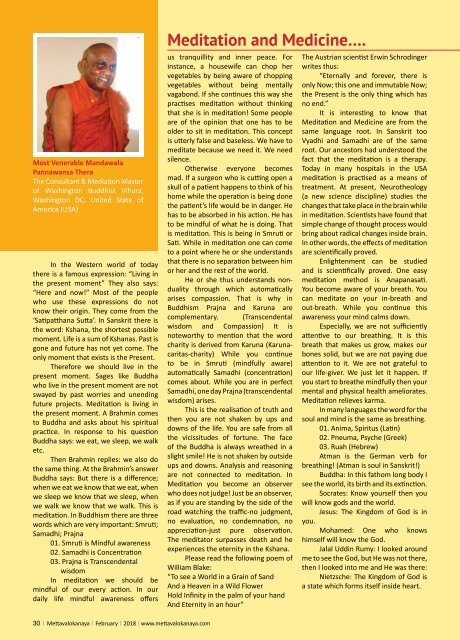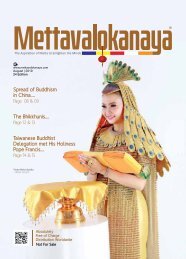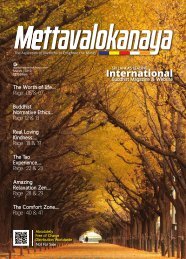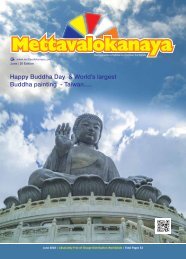Mettavalokanaya_Buddhist_Magazine_February_2018
Create successful ePaper yourself
Turn your PDF publications into a flip-book with our unique Google optimized e-Paper software.
Most Venerable Mandawala<br />
Pannawansa Thera<br />
The Consultant & Mediation Master<br />
of Washington <strong>Buddhist</strong> Vihara,<br />
Washington DC, United State of<br />
America (USA)<br />
In the Western world of today<br />
there is a famous expression: “Living in<br />
the present moment” They also says:<br />
“Here and now!” Most of the people<br />
who use these expressions do not<br />
know their origin. They come from the<br />
‘Satipatthana Sutta’. In Sanskrit there is<br />
the word: Kshana, the shortest possible<br />
moment. Life is a sum of Kshanas. Past is<br />
gone and future has not yet come. The<br />
only moment that exists is the Present.<br />
Therefore we should live in the<br />
present moment. Sages like Buddha<br />
who live in the present moment are not<br />
swayed by past worries and unending<br />
future projects. Meditation is living in<br />
the present moment. A Brahmin comes<br />
to Buddha and asks about his spiritual<br />
practice. In response to his question<br />
Buddha says: we eat, we sleep, we walk<br />
etc.<br />
Then Brahmin replies: we also do<br />
the same thing. At the Brahmin’s answer<br />
Buddha says: But there is a difference;<br />
when we eat we know that we eat, when<br />
we sleep we know that we sleep, when<br />
we walk we know that we walk. This is<br />
meditation. In Buddhism there are three<br />
words which are very important: Smruti;<br />
Samadhi; Prajna<br />
01. Smruti is Mindful awareness<br />
02. Samadhi is Concentration<br />
03. Prajna is Transcendental<br />
wisdom<br />
In meditation we should be<br />
mindful of our every action. In our<br />
daily life mindful awareness offers<br />
Meditation and Medicine….<br />
us tranquillity and inner peace. For<br />
instance, a housewife can chop her<br />
vegetables by being aware of chopping<br />
vegetables without being mentally<br />
vagabond. If she continues this way she<br />
practises meditation without thinking<br />
that she is in meditation! Some people<br />
are of the opinion that one has to be<br />
older to sit in meditation. This concept<br />
is utterly false and baseless. We have to<br />
meditate because we need it. We need<br />
silence.<br />
Otherwise everyone becomes<br />
mad. If a surgeon who is cutting open a<br />
skull of a patient happens to think of his<br />
home while the operation is being done<br />
the patient’s life would be in danger. He<br />
has to be absorbed in his action. He has<br />
to be mindful of what he is doing. That<br />
is meditation. This is being in Smruti or<br />
Sati. While in meditation one can come<br />
to a point where he or she understands<br />
that there is no separation between him<br />
or her and the rest of the world.<br />
He or she thus understands nonduality<br />
through which automatically<br />
arises compassion. That is why in<br />
Buddhism Prajna and Karuna are<br />
complementary. (Transcendental<br />
wisdom and Compassion) It is<br />
noteworthy to mention that the word<br />
charity is derived from Karuna (Karunacaritas-charity)<br />
While you continue<br />
to be in Smruti (mindfully aware)<br />
automatically Samadhi (concentration)<br />
comes about. While you are in perfect<br />
Samadhi, one day Prajna (transcendental<br />
wisdom) arises.<br />
This is the realisation of truth and<br />
then you are not shaken by ups and<br />
downs of the life. You are safe from all<br />
the vicissitudes of fortune. The face<br />
of the Buddha is always wreathed in a<br />
slight smile! He is not shaken by outside<br />
ups and downs. Analysis and reasoning<br />
are not connected to meditation. In<br />
Meditation you become an observer<br />
who does not judge! Just be an observer,<br />
as if you are standing by the side of the<br />
road watching the traffic-no judgment,<br />
no evaluation, no condemnation, no<br />
appreciation-just pure observation.<br />
The meditator surpasses death and he<br />
experiences the eternity in the Kshana.<br />
Please read the following poem of<br />
William Blake:<br />
“To see a World in a Grain of Sand<br />
And a Heaven in a Wild Flower<br />
Hold Infinity in the palm of your hand<br />
And Eternity in an hour”<br />
The Austrian scientist Erwin Schrodinger<br />
writes thus:<br />
“Eternally and forever, there is<br />
only Now; this one and immutable Now;<br />
the Present is the only thing which has<br />
no end.”<br />
It is interesting to know that<br />
Meditation and Medicine are from the<br />
same language root. In Sanskrit too<br />
Vyadhi and Samadhi are of the same<br />
root. Our ancestors had understood the<br />
fact that the meditation is a therapy.<br />
Today in many hospitals in the USA<br />
meditation is practised as a means of<br />
treatment. At present, Neurotheology<br />
(a new science discipline) studies the<br />
changes that take place in the brain while<br />
in meditation. Scientists have found that<br />
simple change of thought process would<br />
bring about radical changes inside brain.<br />
In other words, the effects of meditation<br />
are scientifically proved.<br />
Enlightenment can be studied<br />
and is scientifically proved. One easy<br />
meditation method is Anapanasati.<br />
You become aware of your breath. You<br />
can meditate on your in-breath and<br />
out-breath. While you continue this<br />
awareness your mind calms down.<br />
Especially, we are not sufficiently<br />
attentive to our breathing. It is this<br />
breath that makes us grow, makes our<br />
bones solid, but we are not paying due<br />
attention to it. We are not grateful to<br />
our life-giver. We just let it happen. If<br />
you start to breathe mindfully then your<br />
mental and physical health ameliorates.<br />
Meditation relieves karma.<br />
In many languages the word for the<br />
soul and mind is the same as breathing.<br />
01. Anima, Spiritus (Latin)<br />
02. Pneuma, Psyche (Greek)<br />
03. Ruah (Hebrew)<br />
Atman is the German verb for<br />
breathing! (Atman is soul in Sanskrit!)<br />
Buddha: In this fathom long body I<br />
see the world, its birth and its extinction.<br />
Socrates: Know yourself then you<br />
will know gods and the world.<br />
Jesus: The Kingdom of God is in<br />
you.<br />
Mohamed: One who knows<br />
himself will know the God.<br />
Jalal Uddin Rumy: I looked around<br />
me to see the God, but He was not there,<br />
then I looked into me and He was there:<br />
Nietzsche: The Kingdom of God is<br />
a state which forms itself inside heart.<br />
Most Venerable Wathogala<br />
Dhammika Nayaka Thero<br />
The Chief High Priest Judiciary<br />
of Italy and Chief Incumbent of<br />
Brescia <strong>Buddhist</strong> Temple in Italy,<br />
Royal Pandith<br />
—wkaO[ap talplaLq[ap wdrld<br />
mßjÊcfha - oaúplaLqx mk fifj:<br />
fiÜGx mqßimq.a.,ka;s˜ ^wx' ks' 1" 238<br />
msgqj&<br />
wd.ñl ùu yqfola mrf,dj<br />
Ôú;h ksidu isÿ l< hq;a;la fkdfjhs'<br />
mrf,djla we;;a ke;;a wd.ñl<br />
ùu wjYH lrkafka fuf,dj Ôú;h<br />
iunrj mj;ajd .ksñka iudch<br />
flfrys ys;dkqlïmSj l%shd lsÍu msKsi<br />
hs' mrf,djla we;ehs úYajdi lrk<br />
wh ta ksid u wd.ñl j;dj;aj,<br />
fhfo;s' mrf,dj Ôú;h iemj;a lr<br />
.ekSu msKsi mska oyï l=i,a oyï /<br />
ia lr;s' tfy;a wm wd.ñl Ôú;hla<br />
.; l< hq;af;a fuf,dj Ôú;h iqjm;a<br />
lr .ekSfï taldhk n,dfmdfrd;a;=j<br />
we;sjhs'<br />
ñksid iajNdjfhkau rxpq<br />
jYfhka iduQyslj Ôj;aùug leu;s<br />
i;a;ajhfhls' ta wkqj wms mqoa., noaO<br />
iudchl Ôj;a jkafkuq' uõmshka"<br />
¥orejka" jeäysáhka" {d;s ys;ñ;%hska"<br />
wi,ajeishka" mqrjeishka jYfhka wmf.a<br />
iudc iïnkaO;d b;d úYd, h' fuu<br />
in|;d ;=< wOHdmk" /lSrËd" jHdmdr<br />
wd§ lghq;= fuka u" ;j;a j.lSï yd<br />
hq;=lï rdYshla wmf.a ffoksl Ôú;hg<br />
tl;= ù we;' biamdiqjla ke;s ;rug<br />
f.dv .eiS we;s fujeks lghq;= w;rg<br />
wd.ñl ùu b;d wmyiq lghq;a;la f,i<br />
fndfyda fokd l,amkd lr;s' fï ksid<br />
wd.ñl ùu Ôú;fha úY%dñl wjêhg<br />
wh;a lghq;a;la f,i we;eïyq i

















